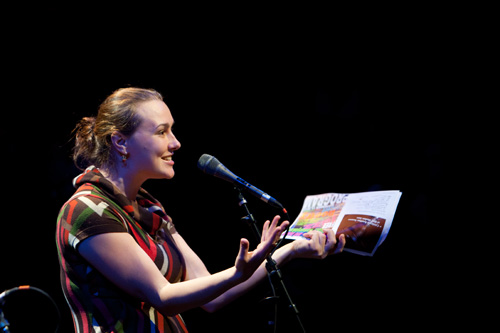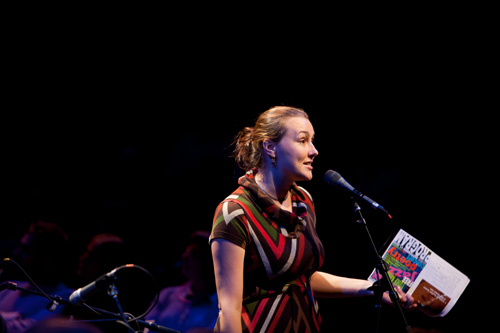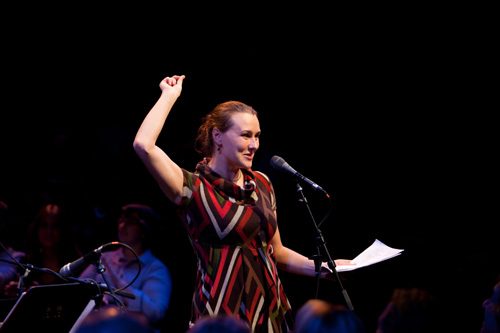Maryja Martysevich: The Unassuming Fortitude of Belarusian FeminEasts
by Rita Malikonyte Mockus / September 30, 2010 / No comments

Maryja Martysevich performing spoken word at the Jazz Poetry Concert, Photo © Renee Rosensteel
In her 2006 essay, “The Men We Choose,” Belarusian writer Maryja Martysevich audaciously describes the fate of the men in her country: “A Belarusian is a loser, there is no escape. Loser is the universal karma of every man who bears the tax duty stamp Belarus, it embraces the intellectual sphere as well as everyday life.” To this blunt observation she adds the paradox that Belarusian women seem to be irresistibly attracted to losers. She writes that the reasoning behind Belarusian women’s embrace of their countrymen is, “I pity you, therefore I love you.”
Martysevich is a poet, essayist, translator, and blogger. She is also the author of Dragons Fly for Spawning, a collection of essays. Martysevich is currently a participant of the University of Iowa’s International Writing Program.
Recently she read her poetry at the annual City of Asylum Jazz Poetry Concert with the writers Yusef Komunyakaa (USA), Khet Mar (Burma), Horacio Castellanos Moya (El Salvador), and Hinemoana Baker (New Zeland).
In this interview, Martysevich shares her thoughts on cultural, gender, and political issues in her homeland and reflects on what it means to be a Belarusian writer.
Your writing is associated with the concept of feminEast. Can you tell us what this neologism means?
In my essay “The Men We Choose,” I describe Belarusian women as feminEasts. However, the feminEast phenomenon is not unique to Belarus. One can find feminEasts in other countries like Russia or even Egypt, where men are in power and women have to create special conditions for themselves in order to express their independence without open political declarations and demands. Unlike Western feminists, the feminEasts contribute to various cultural, creative, and political aspects of their country anonymously. Belarusian feminEasts, for example, provide sagacious support to the men who rule.

Maryja Martysevich performing spoken word at the Jazz Poetry Concert, Photo © Renee Rosensteel
In your work, the concept of feminEast contains a kind of ironic duality. On the one hand, it conveys a particular romantic “attraction to losers.” On the other, it shows a well-articulated recognition of the patriarchal tradition in Belarus that you seem to criticize. In “The Men We Choose,” you write, “There will never be a revolution in Belarus.” Because of their consenting resignation, are Belarusian women partially to blame for maintaining a tradition which is unfavorable to them?
There are many reasons for why we should not blame Belarusian women for their seemingly “consenting resignation.” As I mentioned earlier, even though women in Belarus don’t rule publicly, they actually rule informally. I describe it as an “underground matriarchy.” Belarusian women are experts in many fields ranging from economics to education and culture. In the post-Soviet society, we call them “small authorities” that have a lot of internal power and resources. They understand the shortcomings of their men, but they also understand where these weak points stem from.
Contemporary Belarusian women are aware of the fact that they are part of the culture that observes conservative customs. As paradoxical as it may sound to Westerners, women in our society still believe that it’s not their place to govern. They know they have a lot of power, but in most cases they don’t try to make it political. Many of them hold an orthodox belief that it would be indecent to do so.
Nevertheless, things have started to change in our country. A new wave of independent female art has recently emerged and is now flourishing. We also have many influential female journalists and social activists working in Belarus today. So I believe that soon we will start witnessing a better gender balance in the political sphere as well.
In 2003, Lyudmila Gryaznova, the Vice-Chairperson of the United Democratic Party of Belarus, was sentenced to 15 days in jail for organizing public protests. She said that the freedom of expression situation in Belarus “is generally very bad.” According to her, President Alexander Lukashenko’s regime suppresses the independent media. What are your thoughts about freedom of creative expression in Belarus?
As a writer, I try to characterize the Belarusian situation in figurative terms by using metaphor instead of engaging in contemporary political polemics. Even though Lukashenko has been in power for more than 15 years and is often informally referred to as bats’ka (“father”), I don’t think we have a complete dictatorship in our country: we can do what we want; we can travel wherever we want, and we can even write whatever we want, unless we openly oppose our leaders.
Politicians in our country are not that interested in micro-controlling the creative forces of their nation; they are too busy promoting their own political programs and securing their policies. As a consequence, they endorse the kinds of writing that are supportive of their own ideology. As for the rest of us, we either have to self-publish through the independent publishing houses or find alternative ways to promulgate our literary creations.
The image of the border often appears in your writing. Does this image refer to a specifically Belarusian experience or does it pertain to a more universal human condition?
In my writing I use two kindred ideas: border and birth. They both express the excitement of novelty, but also the anxiety associated with it. I could say that the experience of crossing the border, of leaving the country, and the unfamiliarity associated with it is a universal kind of adventure. Belarus is a very rich case in that it is surrounded by several fascinating countries, including Poland, Lithuania, Latvia, Russia, and Ukraine. Thus, in my writing I focus mostly on what it means for a Belarusian citizen to arrive at the geographical boundary of her country.
The border can also be equated with “being in between,” a common metaphor in Belarusian pop culture and literature. The theme that I like to explore is the indigenous Belarusian feelings of ambiguity, adaptation, and nostalgia associated with the three moments of travelling: leaving, transition, and return.
You are also a translator. Since translation familiarizes you with the literary cultures of various countries, do you see it as related to the idea of crossing borders?
First of all, I think that translation is a distinctive art form. Translation is not a matter of technicality. It is a situation of deep analysis and understanding.
In some ways, translation is a kind of “border” experience; it is as if you stand in front of a new personality and try to feel what it is like to write like that person. It is an intimate encounter with the unknown that you finally start to grasp.
As for Belarus, in the 20th century our culture experienced many curtailments as Modernism was extirpated during the ’30s in Belarus. I believe that translation from other languages is a kind of borrowing which helps us compensate for the lack of something in our current literary world. It also enriches and “completes” our culture as well as inspires us to become less prejudiced and more global.

Maryja Martysevich performing spoken word at the Jazz Poetry Concert, Photo © Renee Rosensteel
The Jazz Poetry Concert seems to offer opportunities for many kinds of border crossings with writers and musicians from all over the world coming together and sharing their work. What are your thoughts on the work of City of Asylum and how does Jazz poetry help you pass your personal creative message to the world?
Every writer knows her own culture and its traditions best. Therefore, she not only echoes the mood of her environment, but also anticipates authentic reception of her work from that environment. Unfortunately, some writers are forced by the local politics to write abroad because they speak against the criminal activities of the extreme regimes in their homelands.
I am lucky in that respect. I don’t need a refuge in order to speak my mind freely. Nevertheless, it is my great privilege to perform my poetry in front of the multicultural audience during this Jazz Poetry concert in Pittsburgh. It allows me to disseminate the peculiar characteristics of Belarusian culture outside its own region.
Read Rita’s bio.




